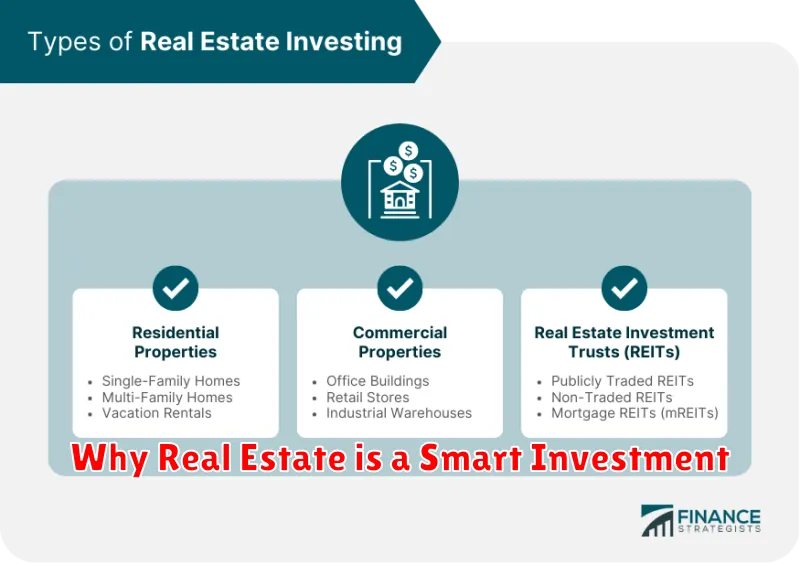Are you seeking a proven path to long-term wealth? Real estate investment offers a compelling opportunity to build significant financial security. This article explores effective strategies for navigating the real estate market, enabling you to make sound investment decisions and cultivate lasting wealth generation through property ownership. Learn how to leverage real estate for substantial, sustainable returns and secure your financial future.
Why Real Estate is a Smart Investment

Real estate offers several compelling reasons for its status as a smart investment. First, it provides tangible asset appreciation. Unlike stocks or bonds, which are intangible, property value tends to increase over time, building equity and wealth.
Secondly, real estate generates passive income streams. Rental properties produce consistent cash flow, supplementing your income and helping to offset expenses. This consistent income stream provides a valuable safety net and a hedge against inflation.
Furthermore, real estate offers significant tax advantages. Deductions for mortgage interest, property taxes, and depreciation can significantly reduce your tax burden, making it a more tax-efficient investment compared to many others.
Finally, real estate investing provides hedging against inflation. As inflation rises, so too do rental rates and property values, protecting your investment’s purchasing power.
Types of Real Estate Investments
Real estate offers diverse investment avenues, each with its own risk and reward profile. Understanding these options is crucial for building a successful long-term wealth strategy.
Residential Real Estate involves investing in properties intended for residential purposes, such as single-family homes, multi-family units (apartments, townhouses), and condos. This category offers various strategies, including buy-and-hold for rental income, fix-and-flip for short-term profit, or house hacking to offset mortgage costs.
Commercial Real Estate encompasses properties used for business purposes, including office buildings, retail spaces, warehouses, and industrial properties. These investments generally require larger capital outlays and offer potentially higher returns but also carry greater risk and longer-term commitments.
Industrial Real Estate is a sub-sector of commercial real estate focusing on properties used for manufacturing, storage, and distribution. This sector often involves large-scale investments with longer lease terms and a focus on location and infrastructure.
Land Investment involves purchasing undeveloped land for future development or appreciation. This strategy carries higher risk due to market fluctuations and potential zoning changes, but it can yield significant long-term returns.
Real Estate Investment Trusts (REITs) are companies that own or finance income-producing real estate. Investing in REITs offers diversification and liquidity, allowing investors to participate in the real estate market without directly owning properties.
Mortgage-Backed Securities (MBS) represent ownership claims in a pool of mortgages. This investment provides exposure to the real estate market through a debt instrument, offering potentially higher yields but also carrying higher risk.
The best type of real estate investment depends heavily on individual financial goals, risk tolerance, and investment timeline. Careful research and professional advice are essential before making any decisions.
How to Finance Your First Property

Financing your first property requires careful planning and understanding of available options. Saving for a down payment is crucial; the larger your down payment, the lower your mortgage payments and the less risk you present to lenders. Aim for at least 20%, although some programs offer loans with lower down payments.
Explore different mortgage options. Conventional loans are widely available, but government-backed loans like FHA and VA loans may offer more flexibility for first-time buyers with lower credit scores or smaller down payments. Compare interest rates, loan terms, and closing costs from multiple lenders to find the most suitable option.
Improve your credit score. Lenders assess creditworthiness based on your credit history. A higher credit score improves your chances of securing a favorable interest rate and loan terms. Address any negative marks on your report and pay your bills on time to build a strong credit profile.
Get pre-approved for a mortgage. This demonstrates your financial readiness to potential sellers and gives you a clear picture of how much you can realistically borrow. A pre-approval letter strengthens your negotiating power when making offers on properties.
Finally, seek professional advice. Consult with a financial advisor and a real estate agent to understand your financial capacity and navigate the complexities of the real estate market. Their expertise can greatly assist you throughout the process.
Rental Income vs Property Flipping
Real estate investment offers two primary avenues for profit: rental income and property flipping. Rental income involves purchasing a property and leasing it out to tenants for a consistent monthly cash flow. This strategy prioritizes long-term wealth building through passive income and potential appreciation. The success hinges on careful property selection, effective tenant management, and ongoing maintenance.
Property flipping, conversely, focuses on short-term profits. Investors purchase undervalued properties, renovate them, and quickly resell them at a higher price. This method necessitates significant upfront capital, expertise in renovation, and a keen understanding of market trends. Profit relies heavily on accurate cost estimation and a swift sale, exposing investors to higher risk compared to rental income strategies.
The optimal approach depends on individual investment goals and risk tolerance. Rental income offers stability and consistent returns over time, while property flipping provides the potential for rapid, substantial profits but carries greater risk. Many successful real estate investors employ a hybrid approach, leveraging both strategies to maximize returns and diversify their portfolio.
The Importance of Market Research
Market research is paramount in real estate investment for building long-term wealth. It allows investors to make informed decisions, minimizing risk and maximizing returns.
Thorough research reveals market trends, identifying areas with high growth potential and strong rental demand. This understanding is crucial for selecting profitable properties and strategically timing investments.
Analyzing competitor activity and understanding local economic conditions are also vital components. This allows investors to assess the overall market health and anticipate potential challenges.
Ultimately, comprehensive market research helps investors develop a robust investment strategy, increasing their chances of achieving significant, sustainable returns and building lasting wealth in the real estate market.
Common Real Estate Investment Mistakes to Avoid

Real estate investment offers significant wealth-building potential, but avoiding common pitfalls is crucial for long-term success. One major mistake is underestimating costs. Beyond the purchase price, factor in property taxes, insurance, maintenance, and potential vacancy periods.
Another frequent error is emotional decision-making. Investment choices should be based on thorough due diligence, market analysis, and financial projections, not gut feelings or impulsive purchases. Ignoring professional advice is equally detrimental. Engaging experienced real estate agents, lawyers, and financial advisors provides valuable insights and safeguards against costly errors.
Overleveraging, taking on excessive debt, is a significant risk. While financing can amplify returns, excessive debt leaves you vulnerable to market fluctuations and interest rate changes. Similarly, lack of diversification puts all your eggs in one basket. Spreading investments across different properties or asset classes mitigates risk.
Finally, neglecting property management can lead to significant financial losses. Effective management ensures timely rent collection, maintenance, and tenant relations, maximizing your return on investment. Careful planning and a strategic approach are vital to successful real estate investing, allowing you to build long-term wealth while minimizing potential setbacks.
Tax Benefits of Real Estate Investments
Real estate offers several significant tax advantages that can boost your overall return on investment. These benefits can substantially reduce your tax liability, allowing you to retain more of your profits.
One key benefit is the ability to deduct mortgage interest. This deduction can significantly lower your taxable income, especially in the early years of a mortgage. Additionally, you can deduct property taxes paid on your investment property.
Beyond mortgage interest and property taxes, depreciation is a powerful tool for real estate investors. You can depreciate the value of your investment property over time, reducing your taxable income even further. This is a non-cash expense, meaning you don’t actually pay it, but it lowers your taxable income.
Furthermore, capital gains tax benefits are available upon the sale of your investment property. Certain conditions and holding periods qualify for lower capital gains tax rates. Careful tax planning is crucial to maximize these benefits.
It’s important to note that tax laws are complex and subject to change. Consulting with a qualified tax professional is essential to understand and properly utilize these benefits. They can provide personalized advice based on your specific circumstances and ensure compliance with all applicable regulations.
How to Scale Your Real Estate Portfolio

Scaling your real estate portfolio requires a strategic approach focused on consistent growth. This involves careful planning and execution across several key areas.
First, diversify your investments. Don’t put all your eggs in one basket. Explore different property types (residential, commercial, industrial), locations, and investment strategies (rental income, fix-and-flip, wholesaling). This mitigates risk and maximizes potential returns.
Next, secure reliable financing. Explore various lending options including traditional mortgages, private money lending, and hard money loans. Understanding your credit score and building strong relationships with lenders are crucial for securing favorable terms.
Optimize your operations. Streamline property management tasks by using property management software or hiring a professional property manager. This frees up your time to focus on acquiring more properties and improving your overall portfolio.
Continuously learn and adapt. The real estate market is constantly evolving. Stay updated on market trends, new investment strategies, and legal changes. Networking with other investors and attending industry events is vital for ongoing learning and growth.
Finally, reinvest profits wisely. Instead of withdrawing profits, reinvest them back into your portfolio to accelerate growth. This creates a compounding effect, significantly boosting your long-term wealth.

